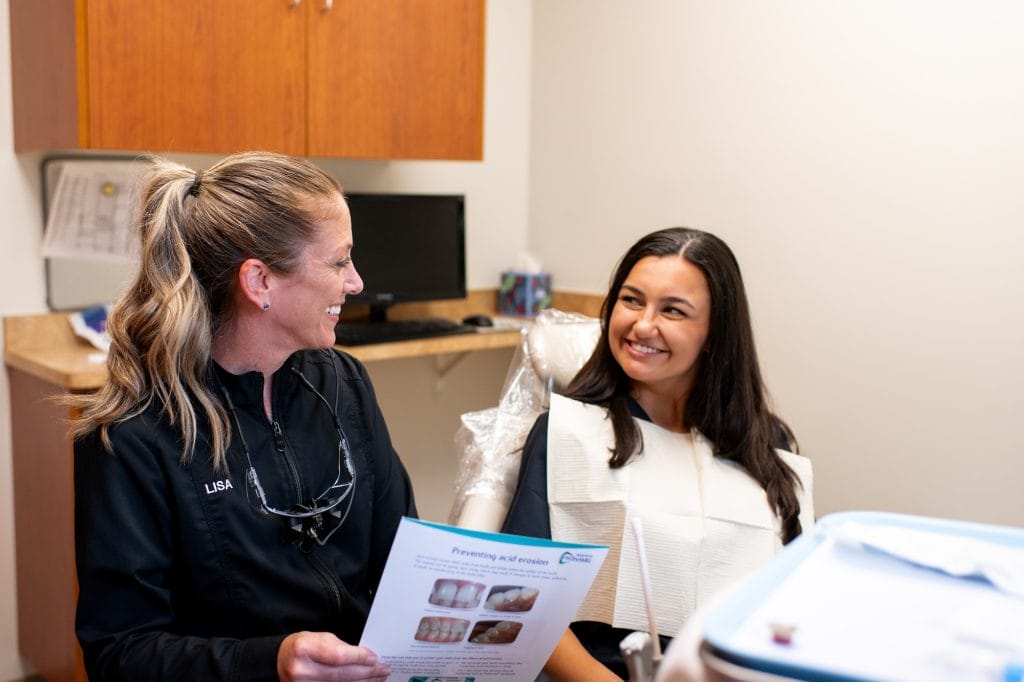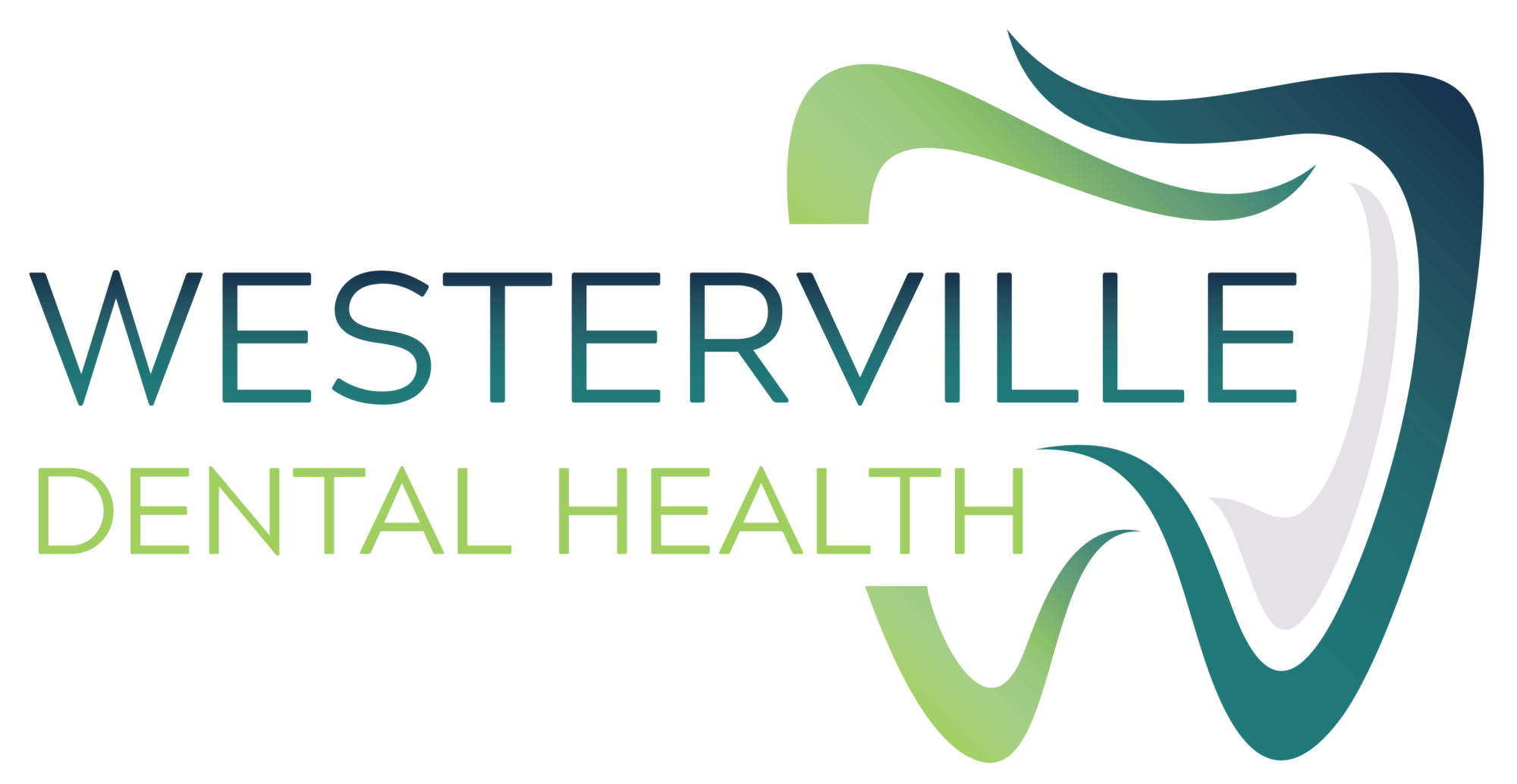
Root Canal Treatment in Westerville
A root canal is a common dental procedure used to save a tooth that is badly damaged or infected. The process requires careful removal of the infected or damaged tooth pulp, the innermost layer of the tooth. A root canal is usually done with local anesthesia, which makes it a mostly pain-free experience for the patient.
What is the root canal procedure?
Your dentist starts by making a small access hole in the affected tooth. When they reach the inner part called the pulp chamber, they’ll use special tools to carefully remove the dental pulp. This pulp includes nerves, blood vessels, and connective tissue.
After that, your dentist cleans the pulp chamber and root canals well to get rid of bacteria and debris. Once everything is clean, they fill and seal the interior of the tooth using a sealer paste and a rubber compound called gutta-percha. This helps stop further infection. Finally, at the next appointment, a temporary filling is put in place to protect the tooth until a permanent filling or crown is added later.
Signs You May Need a Root Canal
Knowing the early signs of pulp damage is vital for good oral health. Acting quickly can lead to the best results. Pain is often a sign, but many pulp infections might not initially hurt.
You should also pay attention to other symptoms requiring a root canal. These include ongoing sensitivity to hot or cold, tenderness or swelling in your gums, a tooth that gets darker, or a bump on your gums that looks like a pimple. If you are experiencing any of these symptoms, schedule an appointment with your Westerville Dental Health team.
Are root canals painful?
Thanks to local anesthesia, getting a root canal is just as easy as getting a filling. You might feel some pressure or sensitivity while you’re getting the treatment, but it’s unusual to feel severe pain.
Getting a Root Canal vs Extraction
When deciding between getting a root canal or extraction, it’s essential to consider the long-term effects on your oral health. While extraction may seem like a quicker solution, opting for a root canal can help preserve your natural tooth and prevent further complications in the future.
A root canal treatment allows you to keep your natural tooth structure, maintain proper chewing function, and prevent neighboring teeth from shifting. On the other hand, extraction may lead to issues like bone loss, difficulty chewing, and potential misalignment of teeth that can impact your overall oral health. Consult with Dr. Malik or Dr. Emi to make the right decision for you.
What is root canal recovery like after a root canal?
Most patients feel only a little discomfort after the procedure and can usually go back to normal activities in a day or two. Full healing might take a few weeks. Be sure to schedule a follow-up appointment with your Westerville Dental Health dentist. This visit will help check that everything is healing well and to discuss any concerns. Immediately after your root canal procedure, keep these important points in mind:
- Manage discomfort: If you have pain or soreness, use over-the-counter pain medications, like ibuprofen. They can help. Your dentist will tell you the right dose and how often to take it.
- Care for your teeth: While your treated tooth heals, chew on the other side of your mouth. Do this until you get your permanent filling or crown. This helps protect the treated tooth and stops any damage.
- Proper nutrition: Choose soft foods that are easy to chew. This will help avoid putting too much pressure on the treated tooth. Eating well is important for healing and staying healthy.
Do you need a crown after a root canal?
Getting a crown after a root canal is often recommended to protect the tooth and restore its functionality. A crown can provide additional strength to the tooth that has undergone a root canal procedure, preventing it from further damage or breakage. Additionally, a crown can improve the aesthetics of the tooth, ensuring it blends in seamlessly with the rest of your smile. While not always necessary, consulting with Dr. Malik or Dr. Emi about the need for a crown post-root canal is essential for ensuring the long-term health and stability of your tooth, including further restoration of the tooth if needed.
When to Consult Your Dentist at Westerville Dental Health
Regular dental check-ups are important for keeping teeth and gums healthy and helping find problems early. If you feel any pain or have signs that you might need a root canal, it’s important to see your Westerville Dental Health team as soon as possible.
At your visit, we will check your teeth, gums, and surrounding areas to determine the cause of your symptoms. We may also take X-rays to see the affected tooth more clearly, which helps us understand the extent of the decay or damage.
After looking at everything, Dr. Malik or Dr. Emi will suggest the best treatment for your specific situation. A root canal may be needed if the pulp inside the tooth is infected or damaged beyond repair.
Is there anything else I should know?
Knowing about root canal procedures and caring for your teeth after is very important for a good recovery. Use immediate aftercare tips, above, and ask your Westerville Dental Health team for advice to help you heal smoothly. Recovery times can be different, but keeping your mouth clean and going to follow-up appointments is important. If you have any concerns or feel discomfort, contact Westerville Dental Health immediately for the best outcome. Understanding what can happen, like pain or the procedure not working, can help you manage your worries.
Trust your Westerville Dental Health team and practice good oral health for a better experience with root canals. Additionally, it is crucial to continue taking care of your teeth and gums to prevent the need for further root canal treatment. This includes keeping your teeth clean, avoiding sugary foods, and quitting smoking if you are a smoker. For more information on how to take care of your teeth and gums, consult with your Westerville Dental Health team.
If you want to learn more about this procedure, contact our office today at 614-882-6741 to set up a consultation. We will review your oral health and medical history to see if a root canal is necessary.

